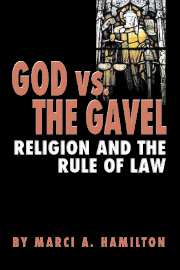Book contents
Epilogue
Published online by Cambridge University Press: 24 July 2009
Summary
After the late 2004 Asian tsunami took more than 150,000 lives and brought devastation to the survivors, many religious relief organizations sprang into action and provided necessary assistance to the suffering. It was a reminder of the great good that religious entities regularly and frequently contribute to the global community. No one and no theory, least of all this book, can take that away from them. God vs. the Gavel, however, brings balance to the assessment of religion in society by acknowledging the great contributions of religion as it reveals religion's capacity in some instances to harm individuals and the public good. The truth is that religious organizations are staffed by humans, who are by nature imperfect and too often driven by the pursuit of power, prestige, and personal pleasure rather than the good of their neighbors and fellow citizens. The correct legal system takes into account both sides. The Religion Clauses prohibit any law that is hostile to religion, but they do not mandate naivete on the part of legislators and the citizens they serve.
That is why duly enacted criminal and civil laws must be enforced against conduct even when it is religiously motivated.
The 2004 Presidential election brought home the fact that religion, politics, and power are intimately connected in the United States. Religious entities are not above the political fray at all, but rather delivering potent blows within it.
- Type
- Chapter
- Information
- God vs. the GavelReligion and the Rule of Law, pp. 306 - 312Publisher: Cambridge University PressPrint publication year: 2005

